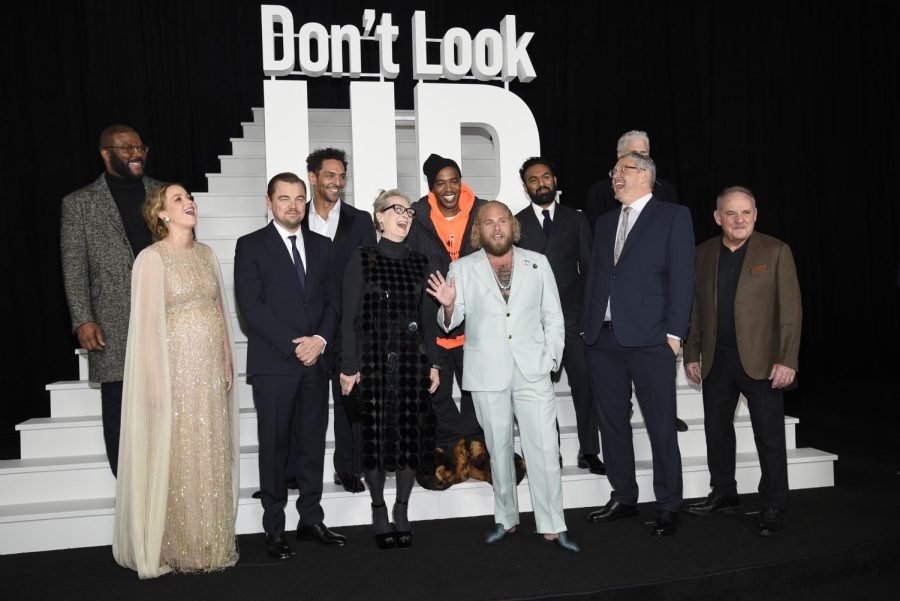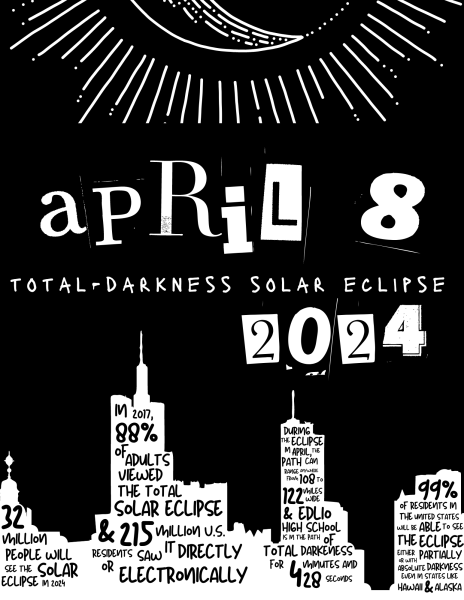Rotten Tomatoes Belong in the Trash
Tyler Perry, Tomer Sisley, Kid Cudi, Hamesh Patel, Ron Perlman, Jennifer Lawrence, Leonardo DiCaprio, Meryl Streep, Jonah Hill, Adam McKay, and Paul Guilfoyle gather at the Dec. 5 world premiere of “Don’t Look Up.”
January 14, 2022
Picture your favorite painting. Picasso, Basquiat or Goya, it doesn’t really matter.
In your eyes, it’s a masterwork, beautifully painted and conceived. But a critique claims that it’s objectively hideous. Why?
Because the oblivious critic prefers sculpture to paint.
It sounds ridiculous, but just that is a regular occurrence in another corner of the art world: Film.
Rotten Tomatoes, a film review service that has rocketed to fame in recent years for percentage-based scores and scathing reviews, is by far the worst perpetrator.
Even before the Dec. 2021 release of “Don’t Look Up”, the rotten review site had already decided it was unobjectively bad, a conclusion reached rather subjectively.
“Ultimately, Don’t Look Up is more than just mean-spirited and smug. It’s aggressively those things…” critic Max Weiss wrote.
Weiss, and the many other reviewers on Rotten Tomatoes, don’t like the dark, political comedy in “Don’t Look Up.” But in the rush to condemn the movie, it seems they didn’t get that fatalism is the film’s entire point.
Rotten Tomatoes gave “Don’t Look Up” a 55%, below its average of 62% according to Global News.
Rotten Tomatoes’ system of compiling “Top Critics’” ratings to create seemingly ironclad scores is moldy to the core. Not only do numbers not apply to art, but the scoring metric allows any critic to review any movie, disregarding the complexity of movie-making and genre.
Because of this, more and more genre films are being disregarded for the trademarks of their style.
In 2021 alone, a number of movies across many genres were spoiled by the “rotten” splat, an all-too-common honor bestowed for scores below 60%.
“Mortal Kombat” was given a 54% by critics for being too focused on… combat.
“A half-baked gory intro to a Saturday morning cartoon show that we don’t even get to see,” Witney Seibold said.
Anyone who has played the games, gruesomely violent and plotless, will see the issue with this.
Similarly, “Spiral: From The Book of Saw” was given a 37%.
The top critique on the Rotten Tomatoes page, from Mark Kermode, reads “I like being scared; what I don’t particularly like is being grossed or winced out.”
Going into a “Saw” movie and whining about gore is like going into a metal concert and complaining about the screaming.
The trend between these movies, and a number of others, is that they are scored by critics who don’t appreciate or understand their genre.
To cement this, one need only look at the audience score for each film.
“Don’t Look Up” was given a 78% audience score, “Mortal Kombat” was given 86% and “Spiral” was given a 75%. The difference is that viewers are more likely to watch a film if they enjoy the genre.
A horror buff isn’t about to watch “Mamma Mia” and then bash it online because, seemingly unlike critics, they know that’s unfair.
That said, “Mamma Mia” isn’t safe either. Many classics have been slaughtered on the site despite their status.
“Hocus Pocus” has a 37%, “Hook” has a 29% and “Newsies” has a 39%, proving the issue isn’t isolated to the new or cult.
The point isn’t that films shouldn’t be criticized. And it certainly isn’t that these movies are all good, that’s irrelevant. However, the problem is that quality also seems to be irrelevant to the scores they receive.
It’s given that people, which does include critics, have preferences. But with that, the attractive simplicity of Rotten Tomatoes becomes faulted, because any critic can review a film regardless of tastes or knowledge.
If a famous oil painting critic spat on a painting for being done in watercolor, they’d be met with laughter. So why do we let moldering movie critics put down films we genuinely enjoy, just because they don’t?





















